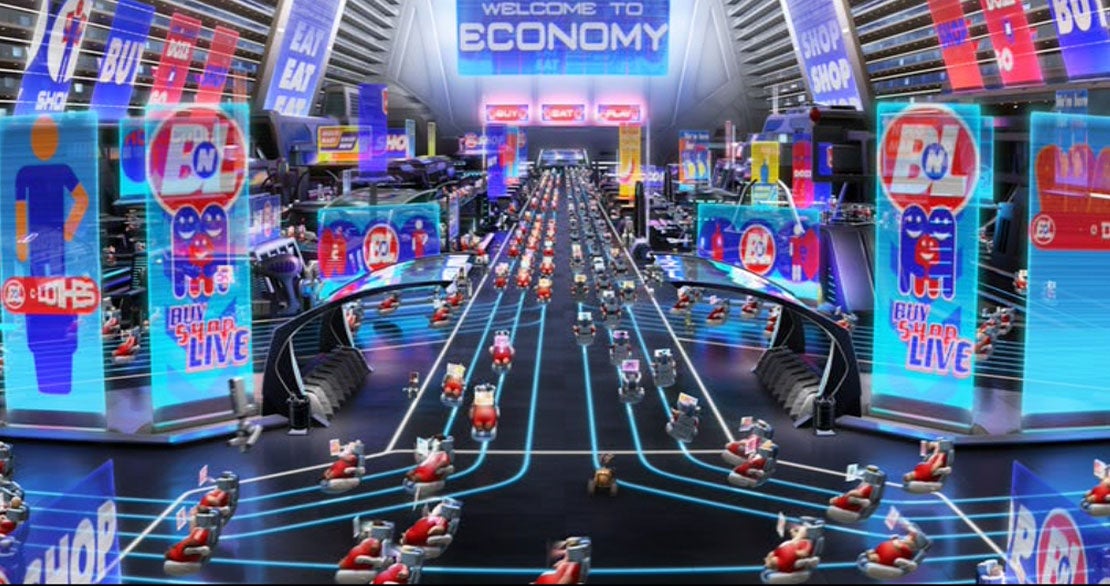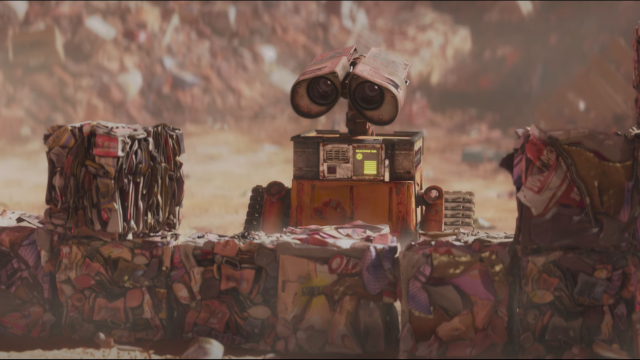I was sick in bed when Jeff Bezos took his 10-minute trip in a dick-shaped rocket to suborbital space on Tuesday morning, so I tuned out all the fawning cable news coverage proclaiming that this was somehow good for humanity. (It’s not). Instead, I watched something else.
In it, a global mega-corporation has destroyed Earth, transforming the planet into a wasteland strewn with trash where nothing can grow. All life on the planet — save for one cockroach — has either perished or escaped to spend eternity on a spaceship called the Axiom, where humans are waited on by robot servants, spend all day watching screens, and smile dully as their muscles atrophy. A sign that reads “Welcome to Economy” hangs over the blank-faced passengers’ heads.
I’m talking, of course, about the Pixar masterpiece Wall-E. Though it was released more than a decade ago, the movie feels eerily prescient of this moment when capitalist titans like Bezos are focused on turning space into either a pleasure zone or an industrial nightmare.
When Wall-E came out in 2008, the fictional Buy-n-Large corporation serving people in space setting drew comparisons to Walmart, but its director Andrew Stanton said the movie was actually inspired by the rise of companies like Amazon. He was definitely onto something. Like Buy-n-Large, which started as a yogurt company, Amazon started in the book market but quickly took over basically everything. And despite Bezos’ proclamations that he cares about the climate crisis, Amazon, like Buy-n-Large, is destroying the Earth. It produces hundreds of millions of pounds of plastic waste, spews toxic and planet-heating gases out of its thousands of vehicles and warehouses, and helps oil companies extract deadly fossil fuels more efficiently. The company also throws out millions of products at just one warehouse, and its waste problem runs deep.
Rather than make any serious attempts to address Amazon’s environmental destruction, Bezos has increasingly talked about how we need to prepare to escape Earth altogether. Just after his trip to space, he blithely remarked that humanity should offload all polluting industry to space. In the past, he’s said that he wants to build colonies in Earth’s orbit to support billions of people.

Wall-E warns us of some of the dangers Bezos’ dream future could bring. We could lose sight of the very things that make us human, like having a relationship with other living things. Earth has been turned into an endless junkyard. Robots like the titular character tend to the waste left behind by a single-use lifestyle perpetuated by a rapacious corporation. Buy-n-Large’s Axiom is a glorified shopping mall, lit by day-glow holographic billboards advertising endless crap to buy from the hover chairs that shuttle the space station’s weakening denizens around to fizzy sodas and quadruple-decker cheeseburgers. Absent is any sense of nature or community. Instead, it’s a purely consumer experience.
One thing we don’t see in Wall-E is what happened in the run-up to humanity leaving Earth. But based on what we know from the real world, wealthy corporate executives likely saw the best outcomes, just like the billionaire space race has seen the richest man on the planet be one of the first to leave Earth. Meanwhile, climate change and ecological destruction have hit the poorest among us the hardest. This can be seen from Black and Indigenous households that are more likely to lose everything when wildfires hit, to environmental justice communities living in the shadows of chemical, paper, and oil refineries producing the single-use items that Amazon loves to sell us, much of which ends up as waste in poorer countries.
Jeff Bezos was right to say that we all paid for his stupid trip to the edge of space — not only because workers and customers made him rich, but also because Amazon and other corporations have offloaded the cost of their pollution onto all of us. This cycle will only worsen in the coming decades unless we take steps to end it.
In real life, we also have no backup plan. If the destruction of Earth continues at its current pace, we’re fucked. We can only keep a handful of people alive on the International Space Station thanks to thousands of workers on the ground supporting them. Even the commercial dystopia that is Axiom is nowhere on the horizon.
Despite these differences, a core message of Wall-E rings true: Life on Earth is doomed if we leave the likes of Jeff Bezos at its helm. We’re headed down a path of annihilation if we keep letting corporations chase endless profit growth. In Wall-E, it’s a helpless robot who’s left to suffer until one brave human leader, the captain of the Axiom, decides to turn the spaceship around and rebuild Earth.
Though Wall-E is dark (I cried at least four times, and this was a rewatch), its ending is relatively optimistic. But today, it’s people who are suffering. And it will take more than one captain to turn the ship around.
